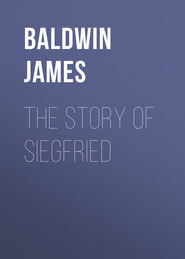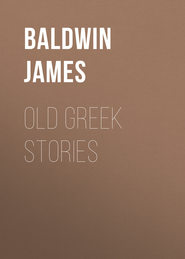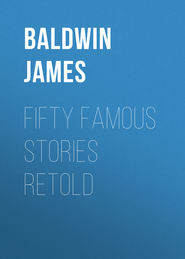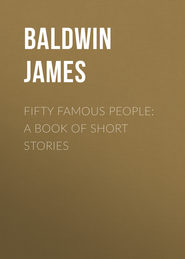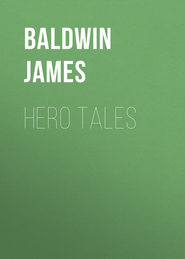По всем вопросам обращайтесь на: info@litportal.ru
(©) 2003-2024.
✖
Four Great Americans: Washington, Franklin, Webster, Lincoln
Настройки чтения
Размер шрифта
Высота строк
Поля
Two weeks before his arrival the battle of Lexington had been fought, and the war of the Revolution had been begun.
Franklin had done all that he could to persuade the English king to deal justly with the American colonies. But the king and his counsellors had refused to listen to him.
During his ten years abroad he had not stayed all the time in England. He had traveled in many countries of Europe, and had visited Paris several times.
Many changes had taken place while he was absent.
His wife, Mrs. Deborah Franklin, had died. His parents and fifteen of his brothers and sisters had also been laid in the grave.
The rest of his days were to be spent in the service of his country, to which he had already given nearly twenty years of his life.
* * * * *
XIV.—FRANKLIN'S WONDERFUL KITE
Benjamin Franklin was not only a printer, politician, and statesman, he was the first scientist of America. In the midst of perplexing cares it was his delight to study the laws of nature and try to understand some of the mysteries of creation.
In his time no very great discoveries had yet been made. The steam engine was unknown. The telegraph had not so much as been dreamed about. Thousands of comforts which we now enjoy through the discoveries of science were then unthought of; or if thought of, they were deemed to be impossible.
Franklin began to make experiments in electricity when he was about forty years old.
He was the first person to discover that lightning is caused by electricity. He had long thought that this was true, but he had no means of proving it.
He thought that if he could stand on some high tower during a thunder-storm, he might be able to draw some of the electricity from the clouds through a pointed iron rod. But there was no high tower in Philadelphia. There was not even a tall church spire.
At last he thought of making a kite and sending it up to the clouds. A paper kite, however, would be ruined by the rain and would not fly to any great height.
So instead of paper he used a light silk handkerchief which he fastened to two slender but strong cross pieces. At the top of the kite he placed a pointed iron rod. The string was of hemp, except a short piece at the lower end, which was of silk. At the end of the hemp string an iron key was tied.
"I think that is a queer kind of kite," said Franklin's little boy.
"What are you going to do with it?"
"Wait until the next thunder-storm, and you will see," said Franklin.
"You may go with me and we will send it up to the clouds."
He told no one else about it, for if the experiment should fail, he did not care to have everybody laugh at him.
At last, one day, a thunder-storm came up, and Franklin, with his son, went out into a field to fly his kite. There was a steady breeze, and it was easy to send the kite far up towards the clouds.
Then, holding the silken end of the string, Franklin stood under a little shed in the field, and watched to see what would happen.
The lightnings flashed, the thunder rolled, but there was no sign of electricity in the kite. At last, when he was about to give up the experiment, Franklin saw the loose fibres of his hempen string begin to move.
He put his knuckles close to the key, and sparks of fire came flying to his hand. He was wild with delight. The sparks of fire were electricity; he had drawn them from the clouds.
That experiment, if Franklin had only known it, was a very dangerous one. It was fortunate for him, and for the world, that he suffered no harm. More than one person who has since tried to draw electricity from the clouds has been killed by the lightning that has flashed down the hempen kite string.
When Franklin's discovery was made known it caused great excitement among the learned men of Europe. They could not believe it was true until some of them had proved it by similar experiments.
They could hardly believe that a man in the far-away city of Philadelphia could make a discovery which they had never thought of as possible. Indeed, how could an American do anything that was worth doing?
Franklin soon became famous in foreign countries as a philosopher and man of science. The universities of Oxford and Edinburgh honored him by conferring upon him their highest degrees. He was now Doctor Benjamin Franklin. But in America people still thought of him only as a man of affairs, as a great printer, and as the editor of Poor Richard's Almanac.
All this happened before the beginning of his career as ambassador from the colonies to the king and government of England.
I cannot tell you of all of his discoveries in science. He invented the lightning-rod, and, by trying many experiments, he learned more about electricity than the world had ever known before.
He made many curious experiments to discover the laws of heat, light, and sound. By laying strips of colored cloth on snow, he learned which colors are the best conductors of heat.
He invented the harmonica, an ingenious musical instrument, in which the sounds were produced by musical glasses.
During his long stay abroad he did not neglect his scientific studies. He visited many of the greatest scholars of the time, and was everywhere received with much honor.
The great scientific societies of Europe, the Royal Academies in Paris and in Madrid, had already elected him as one of their members. The King of France wrote him a letter, thanking him for his useful discoveries in electricity, and for his invention of the lightning-rod.
All this would have made some men very proud. But it was not so with Dr. Franklin. In a letter which he wrote to a friend at the time when these honors were beginning to be showered upon him, he said:
"The pride of man is very differently gratified; and had his Majesty sent me a marshal's staff I think I should scarce have been so proud of it as I am of your esteem."
* * * * *
XV.—THE LAST YEARS
In 1776 delegates from all the colonies met in Philadelphia. They formed what is called the second Continental Congress of America.
It was now more than a year since the war had begun, and the colonists had made up their minds not to submit to the king of England and his council.
Many of them were strongly in favor of setting up a new government of their own.
A committee was appointed to draft a declaration of independence, and Benjamin Franklin was one of that committee.
On the 4th of July, Congress declared the colonies to be free and independent states. Among the signers of the Declaration of Independence was Benjamin Franklin of Pennsylvania.
Soon after this Dr. Franklin was sent to Paris as minister from the United States. Early in the following year, 1777, he induced the king of France to acknowledge the independence of this country.
He thus secured aid for the Americans at a time when they were in the greatest need of it. Had it not been for his services at this time, the war of the Revolution might have ended very differently, indeed.
It was not until 1785 that he was again able to return to his home.
He was then nearly eighty years old.
He had served his country faithfully for fifty-three years. He would have been glad if he might retire to private life.
When he reached Philadelphia he was received with joy by thousands of his countrymen. General Washington was among the first to welcome him, and to thank him for his great services.
That same year the grateful people of his state elected him President of Pennsylvania.






